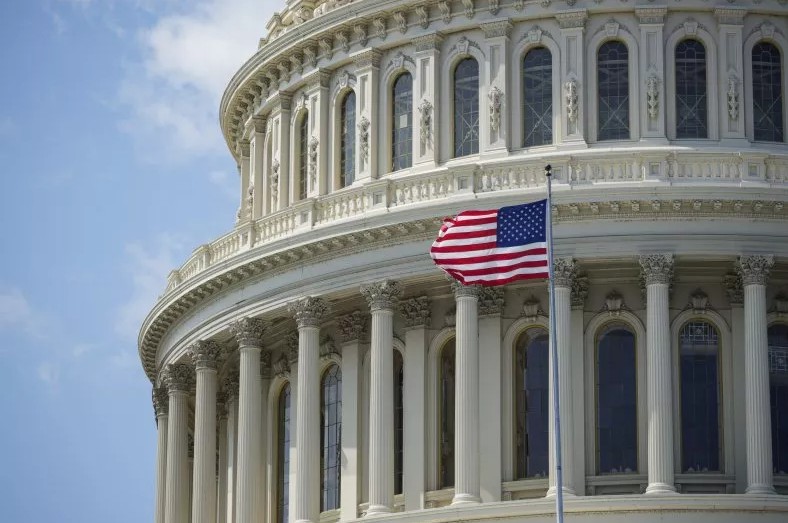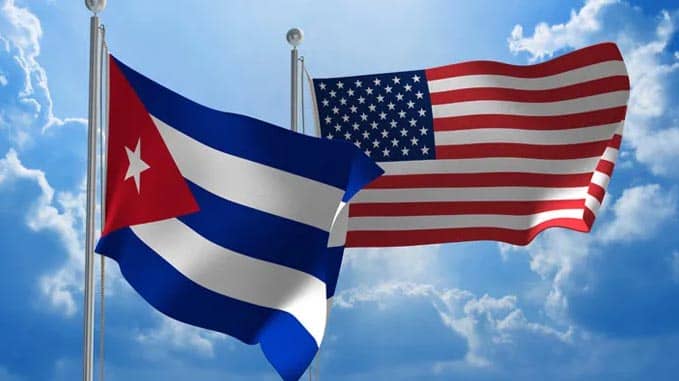About the next Summit of the Americas:
Some ingredients of the American Democracy

The American flag flies in front of the dome of the US Capitol on September 10, 2021 in Washington, DC. Photo: Drew Angerer/GETTY IMAGES
In most of the public presentations of American politicians, the word democracy is repeated over and over again, but without offering definitions of the concept to which they refer. From his perspective, that democracy is something supreme that would be above a specific economic and social regime, of the very idea of a nation, giving the impression of being an inclusive space, when in reality it is the opposite.
In this political jargon, it is assumed that everyone shares the same interpretation of democracy and that everyone would be defending or promoting the same goals, or that they share platforms.
In this struggle, democracy is mimicked in the possibility of choosing representatives, which in essence would be associated with the existence of political parties and, furthermore, it is assumed that these always existed with the same structure and goals.
Try asking an American if George Washington was a Democrat or a Republican. There will be many who will place you in one or another grouping. But the truth is that the founding father and first president of the United States expressed several concerns about the danger of «dividing the nation» by the existence of groups with «special interests».
In his farewell message upon leaving office as President on September 17, 1796, Washington presciently said that political parties «may from time to time serve popular ends, it is probable that, with the passage of time and things, become powerful engines, by means of which cunning, ambitious and unprincipled men will be able to subvert the power of the people and usurp for themselves the reins of government, afterwards destroying the very machines that have raised them to an unjust dominion».
At that time, the dispute that concerned Washington was between the so-called Republican-Democrats, grouped basically in New England, and the Federalists who represented the southern states. These names are enough to indicate that those groups were modified over time both in nomenclature and in the declared objectives they pursued.
But, even at that time manager of the self-styled «beacon of democracy», only white men with large assets or businesses could be members of the parties. To begin with, women, the non-rich and citizens of any non-European origin, especially Afro-descendants, were excluded from electing or being elected.
In other words, the American Democracy, which could be classified in its time as a step forward in relation to the despotic powers of the European autocracies, was being built as another domain scheme that was just as exclusive. Basically, it was about changing the power of lineage for that of wealth, changing the packaging and promoting popular support for the new formula.
Over time, the creators of democracy, in English and with a northern accent, have managed to structure a system of traps that in its perpetual promotion makes the common citizen believe that his opinion counts, that he decides and that in reality through the vote chooses representatives, or influences policy. Nothing further from reality.
There is a small structure in American politics that is hardly mentioned, goes unnoticed by the eyes of analysts. The so-called assemblies, or caucuses, are those formations that exist from the base, at the neighborhood level, which are forming the ladder for the rise to local or federal power of the political parties that have a presence both in the state legislatures (eight ), or at the federal level (two).
In each state (50) and in each town or city (more than 35,000) specific rules are used to decide on the candidates that will appear in the elections. In the United States every four years presidential elections are held and two years after these the so-called mid-term elections.
On each occasion, the voter who stands before the ballot to exercise the right to vote has to decide on a long list of issues: president, senator (33 are elected every two years) at the state level, representative to the Chamber (one per each district), mayors, governors, presidents of school boards and countless other public servants, according to the rotations established in each case. And in addition, issues or amendments are voted on that, previously and using very dissimilar mechanisms, are approved and included in the ballots.
Wow, well seen like this it seems to work and would be a worthy model to be copied. But let’s use the can opener to see what else is inside.
Returning to the caucuses, which are scattered throughout the nation, in many cases, they function as sects, or social clubs, which are almost impossible for people without resources to access. In the minority of states, these caucuses choose the names of the candidates, in most of them, it is done through the voting mechanism called “primaries”, which despite being more transparent is in the same way dominated by the caucuses themselves.
It is impossible to think that a candidate can have any projection beyond his area of residence, if he does not have the blessings of the local chiefdoms, which is achieved through alliances, debts, promises, or with a lot of money. Intellectual qualification, talent, life’s work, or prestige are neither sufficient nor essential.
Those who are finally elected go on to form other caucuses both in the city commissions and in the state or federal legislatures, which in turn choose their leaders, who decide behind closed doors on all the most important procedural and regulatory issues. . Zero popular participation.
And yet someone would say: the elected have the support of the majority. Other error. All the propaganda that surrounds the spectacle around the elections creates that impression, but the figures say otherwise.
With few exceptions, in the US presidential elections they finally attend to exercise their vote, only a part of those who registered (several requirements to achieve it) previously to do so, which in the end are less than 50% of all citizens with the right to vote.
Between 20 and 30% of the grand total choose those people (not the president) from their own party who will represent them in the electoral college, which has a different number of members for each state, depending on their population.
In other words, the popular vote does not count, unlike most countries, since an indirect mechanism is still used that was conceived to maintain the interest of the southern states in continuing to belong to the Union, since the time of the slavery. Thanks to this formula, for example, in 2016 Donald Trump was elected, receiving 2,870,000 LESS popular votes than Hillary Clinton.
And the defenders of democracy will still say: those who don’t want to don’t attend, but one vote makes a difference. Nor is such a statement accurate. Local caucuses have a good chance of virtually erasing crosses marked on ballots.
In Florida, for example, in the 2018 exercise, it was possible to include the so-called Amendment 4, among the many issues that the voters of the state had to support or not. In the previous stage, a movement was generated (it obtained 1,100,000 signatures) to try to restore the right to vote to around 1,500,000 ex-convicts (the majority of African descent), who could not exercise the vote according to local regulations and who, If they register and mobilize, they could make a decisive difference, presumably in favor of the Democrats.
The topic was approved by POPULAR vote. Celebrations, forecasts, but the joy in the poor man’s house is short-lived. Florida’s 120-strong Republican-majority legislature passed a law that made technicalities nearly impossible to implement Amendment 4 in the state.
After Trump’s defeat in 2020, nearly 300 legislative initiatives were presented in most of the 50 states to affect, in one way or another, the vote of popular sectors that may have a greater Democratic affiliation.
The initiatives ranged from preventing the supply of water and food to those who stand in long queues at schools (the rich don’t do them), limiting early voting (an option for many workers who cannot be absent on election day), to concentrating more electoral colleges in predominantly Republican areas, reducing them in areas considered Democratic.
But if anyone still believes that democracy is a healthy and disinterested exercise, one should remember the story of Mr. Elbridge Gerry, who, as Governor of Massachusetts (later Vice President of the Union) in 1812, signed a law that an electoral district was created in the city of Boston, which had a very deliberate geographic outline, intentionally excluding opponents and including supporters.
His surname and his creation gave rise to what is now known as gerrymandering, or the most extensive corruption of the American democratic process, according to academics.
American politicians are inclined to promote their democracy on the basis of the values promoted by the founding fathers and contained in the country’s Constitution. Small detail:
In addition to the fact that 130 million Americans are not educated enough to read and understand what the text says, none of them, nor their parents, grandparents and other ancestors, never went to a constitutional referendum.On September 17, 1787, only 39 of the 55 delegates to the Philadelphia Constitutional Assembly signed the document. The text has received the reduced number of 27 amendments ratified until 1992, despite the fact that in more than 200 years 11,770 proposals for modification have been presented. In order for a proposal to become an amendment, it must be ratified in principle by the 50 state legislatures, where the decision mechanisms already explained operate.These are just a few ingredients of a democracy that responds to the interests of very few and that has absolutely no merit to be presented as a credential of superiority, or to be promoted as a paradigm by the world.Much less can it be the clean slate by which it is intended to measure the candidate countries to be invited to regional or international events.For another occasion, we leave the analysis of the green ingredient, which in the form of bills influences and conditions the actions of those who have already been elected, so that they respond to very specific interests far from the will of their voters.
Translation by Walter Lippmann for https://groups.io/g/cubanews/message/17928




Déjanos tu comentario